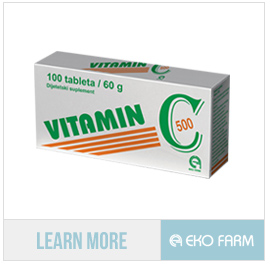A few facts about vitamin C
A few facts about human stomach
How do acids affect our stomach?
Vitamin C tablets dissolution time and gastric discomfort – how are they related?
Stomach diseases as a frequent weakness in population
A few facts about vitamin C
Vitamin C or L-ascorbic acid is a water-soluble vitamin that is necessary for normal growth and development of the human body. It is an essential nutrient, which means that it cannot be synthesized by the body and must be provided continuously through a healthy diet. Raw fruits and vegetables are the best natural sources of vitamin C. Other sources of vitamin C are dietary supplements and fortified foods and beverages, such as breads, grains, cereal, fruit juices, and various dairy products.
Vitamin C is involved in crucial metabolic pathways that contribute in maintaining body’s vitality and natural defence mechanisms. It is required for the biosynthesis of collagen, protection from oxidative stress caused by free radicals, improvement of our immune system, and enhancement of non-haem iron absorption.
Vitamin C is widely spread on the market in solid pharmaceutical forms, such as tablets, film tablets, sugar-coated tablets, in amounts that exceed recommended daily allowance (80mg) for several times (500mg, 100mg, 2000mg). Although it is a moderately weak acid, tablets containing such high levels of vitamin C, could trigger various gastric disorders in both healthy population and chronic gastric patients. That is why it is recommended to use specially formulated fast dissolving vitamin C tablets with minimal gastric side effects.
In order to fully understand the nature of the problem, it is necessary to briefly recall the basis of the structure and function of the human stomach.
A few facts about human stomach
Human stomach is a hollow, muscular organ, located between the esophagus and the small intestine in the upper abdomen. It is an important part of the digestive system, which functions as a second phase food-processing “unit”, further digesting the previously masticated food. It secretes gastric acid and protein-digesting enzyme pepsin, and provides periodical smooth muscular contractions, allowing the food to pass from the stomach to the small intestine. Lumen of the stomach has a low pH (between 1.5 and 3), which helps digestion, and prevents alimentary infections by killing all the germs from ingested food. The main question is then, how does our stomach protect itself from aggressive gastric juices? The answer is – gastric mucosal barrier.
Gastric mucosal barrier consists of compact epithelial cell lining, protective mucus covering, and bicarbonate ions that neutralize gastric acid. It maintains a near-neutral pH at the cell lining-lumen surface, and protects the stomach from autodigestion. Under normal physiological conditions, the gastric mucosal barrier is sufficient for protection of the gastric mucosa. However, if the barrier gets disrupted by different factors, acid diffuses back into the mucosa, potentially causing damage to the stomach itself. This may cause various symptoms, such as heartburn, upper abdominal pain, indigestion, loss of appetite, nausea or even vomiting.
How do acids affect our stomach?
Among other factors, acidic foods, beverages, drugs and dietary supplements may affect the nearly neutral pH of the gastric barrier and cause damage to the exposed epithelial cell lining, and underlying submucosal and muscular layer. This may provoke local irritation of the stomach, especially in people with chronic and recurring digestive disorders.
Vitamin C is a moderately weak acid (pKa= 4.25), only slightly stronger than vinegar (pKa=4,75). It dissolves well in water, giving mildly acidic solutions. Nonetheless, the use of vitamin C in quantities exceeding the recommended daily allowance (RDA) can lead to gastric discomfort, such as heartburn, stomach pain, nausea and vomiting. Although they are more common in people who suffer from some form of chronic gastric disorder, these symptoms can also occur in healthy people. This is especially important when using vitamin C dietary supplements in the form of tablets.
Vitamin C tablets dissolution time and gastric discomfort – how are they related?
Vitamin C tablets dissolution rate directly affects the onset and duration of side effects, such as various gastric disorders. Tablets with longer dissolution time can cause local irritation of the mucous membrane of the stomach, due to the prolonged contact between them. Many patients describe this phenomenon as the subjective feeling of tablets being “glued” to the stomach wall. This is usually manifested as a feeling of discomfort, burning sensation, or pain in the upper abdomen. These symptoms can be minimized by using fast dissolving vitamin C tablets, which are safe and recommended even for people with chronic gastric disorders, whose number tend to increase both in our country and worldwide.
Stomach diseases as a frequent weakness in population
Stomach disorders are very common in human population, and they tend to become even more common mainly due to the widespread unhealthy lifestyle. It is estimated that more than 25% of the population suffers from some type of chronic stomach disorder, such as heartburn, abdominal pain or indigestion. These symptoms usually occur for a long period of time, causing prolonged suffering and poor quality of life. Moreover, these conditions are often followed by frequent doctor visits, and high expense of investigations and treatment, which result in many days off work. This brings great cost to the financial system, due to the fact that most active working men and women (age 20 to 50) are actually at higher risk of developing stomach disorders.
Some of the most common stomach disorders in population include:
– Gastroesophageal reflux disease (GERD) – returning of the stomach contents, including acid, up to the esophagus.
– Functional dyspepsia – frequent sense of discomfort and stomach upset, without the presence of an ulcer.
– Peptic ulcer disease – erosion in the lining of the stomach or duodenum, deep enough to form an ulcer, causing pain and bleeding.
– Gastritis – inflammation of the stomach, often causing pain, nausea or loss of appetite.
– Stomach cancer – malignant changes in the stomach structure, followed by stomach bleeding, weight loss and difficulty swallowing.
– Gastroparesis – delayed emptying of the stomach caused by muscle weakness.
Occurrence of gastric side effects can be avoided to a large extent by using vitamin C based dietary supplements in the form of fast dissolving tablets, both in chronic gastric patients and healthy individuals. Better tolerance of these preparations represents a safe way to better compliance (the degree to which the patient correctly follows medical advice prescribed by the physician), and thus to better treatment efficacy as its ultimate goal.
by: mr ph Iva Majstorović, posted on February 19, 2016
[learn_more caption=”References”]
1. Constance S. Tsao, An Overview of Ascorbic Acid Chemistry and Biochemistry.
https://www.google.rs/search?tbo=p&tbm=bks&q=isbn:0824793137
2. Handbook of Chemistry and Physics (2004), CRC Press, ISBN-13: 978-0849304859.
3. Engle E, Guth PH, Nishizaki Y, Kaunitz JD: Barrier function of gastric mucus gel. Am J Physiol 269:G994-999, 1995.
4. Stomack Disorders, Medline Plus. Retrieved on 2010-01-20.
https://www.nlm.nih.gov/medlineplus/stomachdisorders.html
5. Allen A, Flemström G: Gastroduodenal mucus bicarbonate barrier: protection against acid and pepsin.
http://www.ncbi.nlm.nih.gov/pubmed/15591243
6. Allen A, Hutton DA, Leonard AJ, Pearson JP et al.: The role of mucus in the protection of the gastroduodenal mucosa.
http://www.ncbi.nlm.nih.gov/pubmed/3103205
7. Pravilnik o zdravstvenoj ispravnosti dijetetskih proizvoda; Sl.glasnik RS br. 45/2010, 27/2011, 50/2012, 21/2015, 75/2015
http://www.overa.rs/pravilnik-o-zdravstvenoj-ispravnosti-dijetetskih-proizvoda.html
[/learn_more]
[button link=”#” color=”silver”] Back to top[/button]
[one_half]
[/one_half]

